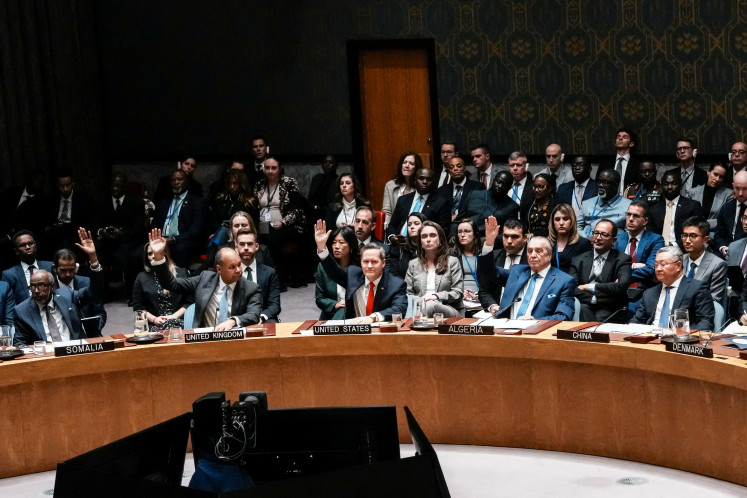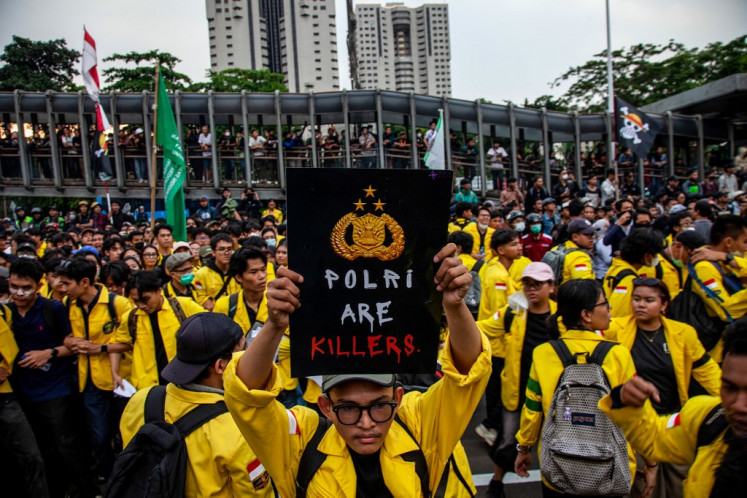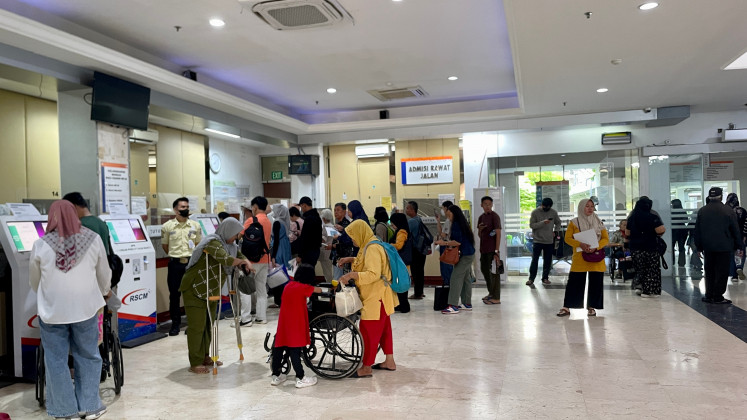Popular Reads
Top Results
Can't find what you're looking for?
View all search resultsPopular Reads
Top Results
Can't find what you're looking for?
View all search resultsHuman rights absence from reform package is a mystery
Notorious case: Activists with the Victims Solidarity Network for Justice staged a protest in front of the State Palace on Sept
Change text size
Gift Premium Articles
to Anyone
N
span class="caption">Notorious case: Activists with the Victims Solidarity Network for Justice staged a protest in front of the State Palace on Sept. 8, in line with the 12th commemoration of the murder of rights activist Munir Said Thalib, in September 2004. The protesters demanded the government to uncover the mastermind behind his murder.(JP/PJ Leo)
Haris Azhar could not hide his disappointment when speaking about the legal reform package President Joko Widodo introduced to the public last month.
As a human rights campaigner, he is dismayed because the package was supposedly intended to vitalize the economy by stemming acute corruption, such as illegal levies and bribery, but in his opinion it grossly sidelines the promotion increased respect for human rights.
Haris is coordinator of the Commission for Missing Persons and Victims of Violence (Kontras), a civil society group that made its name defending victims of right abuses, especially in the final years of the Soeharto dictatorship. Then, it was led by Munir Said Thalib, whose death by poisoning on a flight to the Netherlands in 2004 shook the world due to the alleged involvement of Indonesian intelligence big shots. The mastermind behind his death remains a mystery until today.
Rights activists like Haris expected that the package would address human rights — a touchy issue that they say lacks the attention of the economic-minded Jokowi administration. As a result, the rule of law has been heading in a bad direction.
“After two years in power, President Jokowi came out with this funny agenda,” he said. “He was preoccupied by infrastructure development more than anything else.”
“The KPK [Corruption Eradication Commission] is being destroyed; criminalization cases are abundant; law enforcement is mere lip service and there is no justice for victims of past human rights abuses.”
On Oct. 20, in conjunction with the second anniversary of the Jokowi administration, KontraS released an assessment report on the state of human rights in Indonesia. A crucial issue the document revealed is that cases of torture have risen over the past two years from 98 in 2015 to 108 as of mid-October this year.
Kontras sees the seemingly progressive reform package as Jokowi’s simplification of complex law and human rights issues.
After two years at the helm, Jokowi is yet to make good on promises he made on the campaign trail two years ago to resolve serious past human rights violations as people have persistently demanded.
The cases of rights abuses for which Kontras has been demanding solutions are those related to the aftermath of the 1965 communist purge which claimed hundreds of thousands of lives, the bloody 1989 clash between troops and members of an Islamic sect in Lampung, the deadly 2001 and 2003 Wamena and Wasior incidents in Papua, the 1997 kidnapping of political activists, and the 1998 anti-Chinese rioting.
“I think the people’s trust in the rule of law will be restored once the government solves those cases, as the President has promised in the Nawacita [Nine-point Agenda],” Haris said.
The calls to resolve the abuses also comes from senior lawyer and rights activist Todung Mulya Lubis, who is worried the cases will eventually be forgotten.
“Indonesia’s human rights index is declining […] for instance, the right to live, the right to not be tortured […] and justice for human rights victims. This is a serious matter and a just solution is important,” he said.
But Todung has not lost hope that Jokowi would eventually honor his promise by the end of his term.
“Law reform shouldn’t have been confined to bribery, illegal levies, driver’s licenses and relocation of detainees from overcrowded penitentiaries. People’s rights also need to be protected,” he said.
On the contrary, KontraS is pessimistic that Jokowi has the courage to meet the popular demand given that some elites in his inner circle may not be supportive of the cause.
“Several of his Cabinet ministers were involved in human right violations. One of them was a member of his presidential campaign team,” Haris said.
Among the ministers he was referring to are Coordinating Political, Legal and Security Affairs Minister Wiranto, Defense Minister Ryamizard Ryacudu and TNI’s Strategic Intelligence Agency (BAIS) chief Maj. Gen Hartomo.
Wiranto is implicated in gross human rights violations that occurred during the referendum in Timor Leste in 1999. At that time he was serving as the commander of the Indonesian Military. The Timor Leste government has formally requested Interpol arrest Wiranto.
Ryamizard has been accused of committing rights abuses during military operations in Aceh and Papua during his terms as the Army chief of staff between 2002 and 2005 and chief of the Army’s strategic command (Kostrad).
Meanwhile, Hartomo was sentenced to over three years in prison by a military court in Surabaya, East Java, in 2003 for killing Papuan separatist leader Theys Hiyo Eluay.
There was public consultation prior to the launch of the legal reform package but Jokowi only attended the opening and the closing sessions, according to Haris.
“So, what can we expect?” he said.










